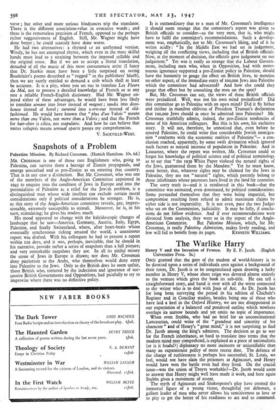Snapshots of a Problem
Palestine Mission. By Richard Crossman. (Hamish Hamilton. 10s. 6d.) MR. CROSSMAN is one of those rare Englishmen who, going to Palestine, can survive there a barrage of Zionist propaganda, and emerge unscathed and as pro-Zionist as on entering that country. That is in any case a distinction. But Mr. Crossman, who was one of the members of the Anglo-American Committee appointed in 1945 to enquire into the condition of Jews in Europe and into the potentialities of Palestine as a relief for the Jewish problem, is a distinguished man whose wide intellect can exclude certain moral considerations only if political considerations be stronger. He is, as this story of the Anglo-American committee reveals, gay, impres- sionable, extremely susceptible to stimuli. Moreover, he is, in his turn, stimulating; he gives his readers much. His mood appeared to change with the kaleidoscopic changes of landscape that he saw—America, Germany, Austria, Italy, Egypt, Palestine, and finally Switzerland, where, after heart-beats • whose eventually synchronous ticking amazed the world, a unanimous report was drafted. With his colleagues he had to present a report within 120 days, and it was, perhaps, inevitable, that he should in his narrative, provide rather a series of snapshots than a full picture; and very remarkable snapshots they are. In all its pitiful misery the scene of Jews in Europe is drawn; nor does Mr. Crossman deny patriotism to the Arabs, who .themselves would deny entry into Palestine to the Jews. Only to the British does he seem unfair, those British who, tortured by the indecision and ignorance of suc- cessive British Governments and Oppositions, had painfully to try to improvise where there was no definitive policy. It is extfaordinary that to a man of Mr. Crossman's intelligence it should seem strange that the committee's report was given to British officials to consider—to the very men, that is, who might have to fulfil the committee's recommendations. Such a develop- ment was, emphatically, not to- Mr. Crossman's liking, and of it he writes acidly : " In the Middle East we had sat in judgement, weighing all the conflicting views, including that of British officials. Now, at the moment of decision, the officials gave judgement on our judgement." Yet was it really so strange that the Labour Govern- ment, including men who, when in Opposition, had with mono- tonous ignorance supported a pro-Zionist policy in Palestine, should have the humanity to gauge the effect on British lives, to mention no other aspect, of the immediate entry of too,000 Jews into Palestine which the committee had advocated? And how else could they gauge that effect but by consulting the men on the spot?
But, Mr. Crossman can say, the views of these British officials were prejudiced. Well, was not his own mind prejudiced? Did this committee go to Palestine with an open mind? Did it fly hither and thither in manifest oblivion of President Truman's declaration that ioo,000 Jews should at once be admitted into Palestine? Mr. Crossman truthfully admits, indeed, the pro-Zionist tendencies of some of his American colleagues. But this is his own, his exclusive story. It will not, therefore, be unnoticed that, even before he entered Palestine, he could write that considerable Jewish immigra- tion " conforms with the economic realities of Palestine"— a con- clusion reached, apparently, by some swift divination which ignored such factors as natural increase of population in Palestine. And in Lausanne, where the report was written, Mr. Crossman could so forget his knowledge of political science and of political terminology as to say that " the 1939 White Paper violated the natural rights of the Jews, guaranteed them by the Mandate." Yet he must know, none better, that, whatever rights may be claiined for the Jews in Palestine, they are not " natural " rights, which patently belong to those inhabitants whose ancestors have lived in the land for centuries.
The sorry truth is—and it is reinforced in this book—that the committee was animated, even dominated, by political conisiderations. Some persuaded themselves that they were being impartial, but compromise resulting from refusal to admit maximum claims by either side is not impartiality. It is not even, pace the two Judges who sat on the Commission, judiciality. It may be folly, if conclu- sions do not follow evidence. And if ever recommendations were divorced from analysis, they were so in the report of the Anglo- American Committee. But Palestine Mission, which, for Mr. Crossman, is really Palestine Admission, makes lively reading, and few will fail to benefit from its pages. KENNETH WILLIAMS.


































 Previous page
Previous page